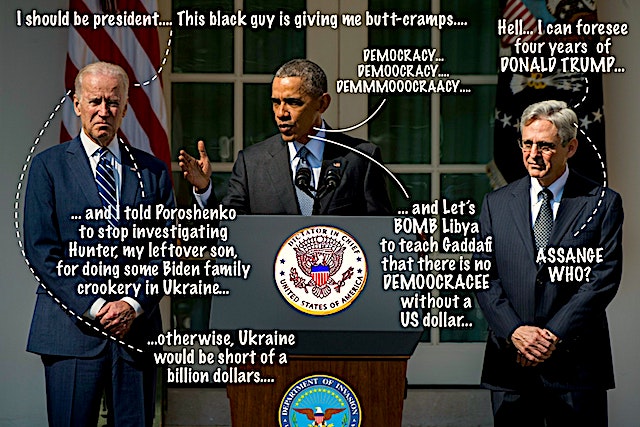Search
Recent comments
- economy 101....
5 hours 41 min ago - peace....
6 hours 30 min ago - making sense....
9 hours 8 min ago - balls....
9 hours 12 min ago - university semites....
10 hours 12 sec ago - by the balls....
10 hours 14 min ago - furphy....
15 hours 29 min ago - nothing new....
16 hours 1 min ago - blood brothers....
16 hours 58 min ago - germanic merde....
17 hours 3 min ago
Democracy Links
Member's Off-site Blogs
of presidential nominees….

On March 16, 2016, President Barack Obama nominated Merrick Garland for Associate Justice of the Supreme Court of the United States to succeed Antonin Scalia, who had died one month earlier. At the time of his nomination, Garland was the Chief Judge of the United States Court of Appeals for the District of Columbia Circuit.
This vacancy arose during Obama's final year as president. Hours after Scalia's death was announced, Senate Majority Leader Mitch McConnell said he would consider any appointment by the sitting president to be null and void. He said the next Supreme Court justice should be chosen by the next president—to be elected later that year.[1][2][3] Senate Democrats criticized the move as being unprecedented, and responded saying that there was sufficient time to vote on a nominee before the election.[4]
Scalia's death brought about an unusual, but not unprecedented, situation in which a Democratic president had the opportunity to nominate a Supreme Court justice while the Republicans controlled the United States Senate. Before 2016, such a situation had last arisen in 1895, when a Republican-led Senate confirmed Democrat Grover Cleveland's nomination of Rufus Wheeler Peckham to the Court in a voice vote;[5][6] conversely, in 1988 a Democratic-led Senate had confirmed Republican Ronald Reagan's nomination of Anthony Kennedy and in 1991, a Senate held 57–43 by Democrats nevertheless confirmed Justice Clarence Thomas.[7]: 75–83 Political commentators at the time widely recognized Scalia as one of the most conservative members of the Court, and noted that—while many considered Merrick Garland a centrist, and he had been called "essentially the model, neutral judge"[8]—a replacement less conservative than Scalia could have shifted the Court's ideological balance for many years into the future. The confirmation of Garland would have given Democratic appointees a majority on the Supreme Court for the first time since the 1970 confirmation of Harry Blackmun.[9]
The 11 members of the Senate Judiciary Committee's Republican majority refused to conduct the hearings necessary to advance the vote to the Senate at large, and Garland's nomination expired on January 3, 2017, with the end of the 114th Congress, 293 days after it had been submitted to the Senate.[10] This marked the first time since the Civil War that a nominee whose nomination had not been withdrawn had failed to receive consideration for an open seat on the Court.[11] Obama's successor, Donald Trump (a Republican), nominated Judge Neil Gorsuch to fill the vacancy on January 31, 2017, soon after taking office.[1
READ MORE:
https://en.wikipedia.org/wiki/Merrick_Garland_Supreme_Court_nomination
FREE JULIAN ASSANGE NOW.........@@@@@@@@@@@@@!!!
- By Gus Leonisky at 21 Jun 2022 - 12:01pm
- Gus Leonisky's blog
- Login or register to post comments
destroying their own global dreams…...
by Professor Dr Eberhard Hamer, Mittelstandinstitut Niedersachsen e.V.
For three decades now, under the leadership of the WEF in Davos, paeans have been sung to the “one world” and the “overcoming of nation states”, the progression from a national economy to a global economy and an unlimited freedom of capital, products, services and labour.
In theory, this was correct because international exchange can be an advantage for all participants:
Those who had previously trusted in globalisation are now suddenly the losers:
The regression from the previously globalised export boom to nothing but safe national production will be a difficult transitional phase of several years, could bring the dreaded stagflation, will in any case have cost-increasing and inflationary consequences from the declining exports and imports as well as from the increasingly expensive relocations of production, which will make the whole world poorer.
How long the recession process lasts will largely depend on how long the US economic sanctions freeze world production and how the Ukraine war develops, whether it can be ended and overcome in peace, or escalates and becomes the third world war waged by the economic blocs.
So, we are facing a shorter or longer globalisation contraction – perhaps the end of globalisation altogether. The long feared economic crash2 or recession will cause our bogus prosperity, based first on exports and then on massive fiat money multiplication, to collapse; the global world will once again become national and our bogus prosperity will sink back into real poverty.
Have the sanctions war-mongers and wealth expropriators considered or even only wanted to consider these consequences? •
READ MORE:
https://www.zeit-fragen.ch/en/archives/2022/nr-12-31-mai-2022/das-ende-der-globalisierungstraeume
READ FROM TOP.
FREE JULIAN ASSANGE NOW................